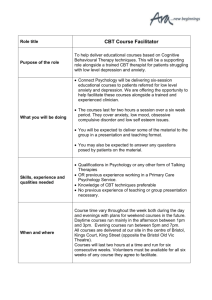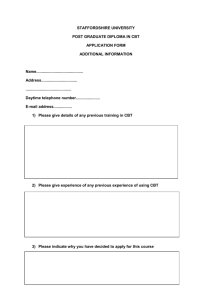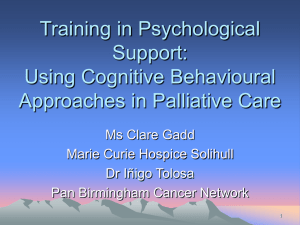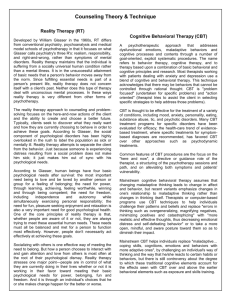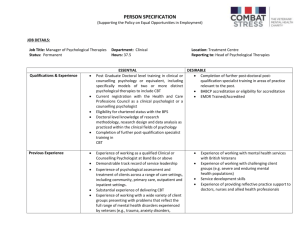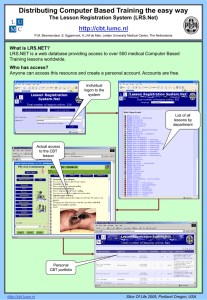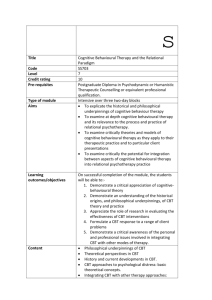Contents - University of Sussex
advertisement
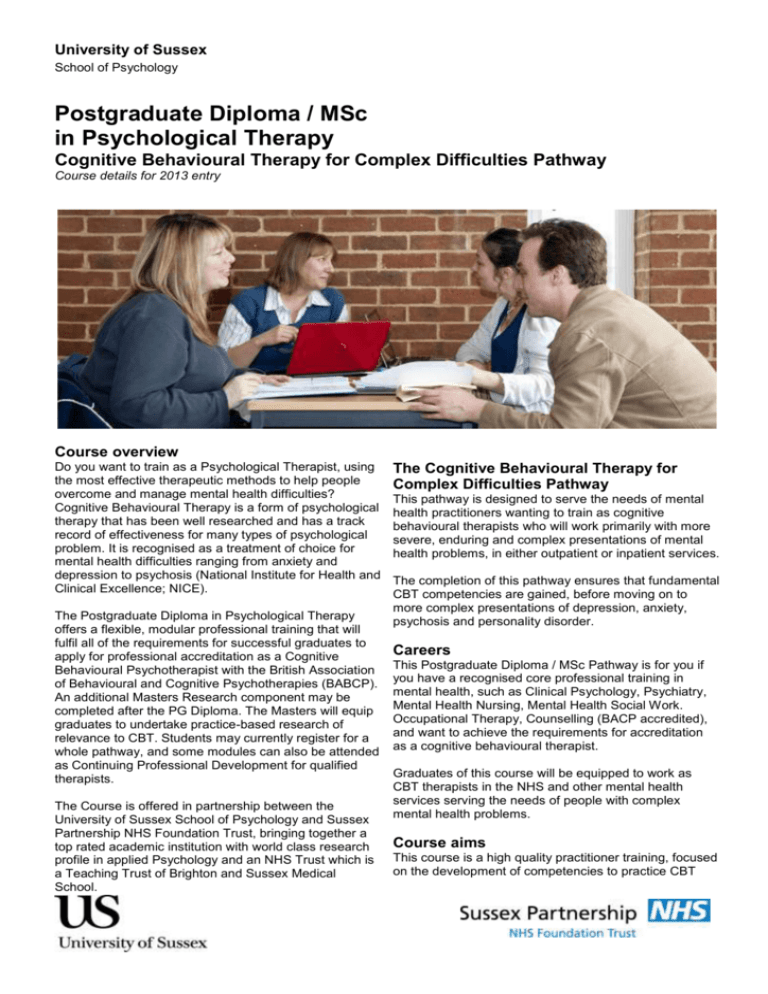
University of Sussex School of Psychology Postgraduate Diploma / MSc in Psychological Therapy Cognitive Behavioural Therapy for Complex Difficulties Pathway Course details for 2013 entry Course overview Do you want to train as a Psychological Therapist, using the most effective therapeutic methods to help people overcome and manage mental health difficulties? Cognitive Behavioural Therapy is a form of psychological therapy that has been well researched and has a track record of effectiveness for many types of psychological problem. It is recognised as a treatment of choice for mental health difficulties ranging from anxiety and depression to psychosis (National Institute for Health and Clinical Excellence; NICE). The Postgraduate Diploma in Psychological Therapy offers a flexible, modular professional training that will fulfil all of the requirements for successful graduates to apply for professional accreditation as a Cognitive Behavioural Psychotherapist with the British Association of Behavioural and Cognitive Psychotherapies (BABCP). An additional Masters Research component may be completed after the PG Diploma. The Masters will equip graduates to undertake practice-based research of relevance to CBT. Students may currently register for a whole pathway, and some modules can also be attended as Continuing Professional Development for qualified therapists. The Course is offered in partnership between the University of Sussex School of Psychology and Sussex Partnership NHS Foundation Trust, bringing together a top rated academic institution with world class research profile in applied Psychology and an NHS Trust which is a Teaching Trust of Brighton and Sussex Medical School. The Cognitive Behavioural Therapy for Complex Difficulties Pathway This pathway is designed to serve the needs of mental health practitioners wanting to train as cognitive behavioural therapists who will work primarily with more severe, enduring and complex presentations of mental health problems, in either outpatient or inpatient services. The completion of this pathway ensures that fundamental CBT competencies are gained, before moving on to more complex presentations of depression, anxiety, psychosis and personality disorder. Careers This Postgraduate Diploma / MSc Pathway is for you if you have a recognised core professional training in mental health, such as Clinical Psychology, Psychiatry, Mental Health Nursing, Mental Health Social Work. Occupational Therapy, Counselling (BACP accredited), and want to achieve the requirements for accreditation as a cognitive behavioural therapist. Graduates of this course will be equipped to work as CBT therapists in the NHS and other mental health services serving the needs of people with complex mental health problems. Course aims This course is a high quality practitioner training, focused on the development of competencies to practice CBT University of Sussex School of Psychology Postgraduate Diploma / MSc in Psychological Therapy Cognitive Behavioural Therapy for Complex Difficulties Pathway Course details for 2013 entry effectively. It emphasises both the empirical basis and the reflective practice of Psychological Therapy. Students will receive expert supervision of practice and be assessed for CBT competence against nationally recognised norms. Course Structure Term Autumn (Oct-Dec) Taught component Assessment Module 1: Fundamentals of CBT (12 Days attendance) Reflective Report of self-practice with CBT methods (2000) Assessment and engagement Therapeutic alliance Formulation Socratic dialogue Use of structure and practice assignments Evidence Base Self-practice Spring (Jan-Apr) Summer (May-Sept) Module 2: CBT for Anxiety (Complex presentations) (6 days attendance) Panic Disorder/Agoraphobia Social Anxiety GAD OCD PTSD Module 3: CBT for Depression (Complex Presentations) (5 days attendance) Behavioural Activation; Cognitive Therapy for Depression Module 4: CBT for Psychosis (6 days attendance) Engagement Working with families and carers Coping strategy enhancement Interventions for delusions and voices CBT for Bipolar Disorder Module 5: CBT for Personality Disorder (6 days attendance) Engagement; Interpersonal Processes Cognitive and Behavioural change methods Emotional regulation Autumn (Oct – Jan) No taught component Clinical practice Component Evidence-base essay (2000) Objective Structured Clinical Examination (OSCE) Anxiety Case Report (2000 words) Formative Audio Recording of Therapy Depression Case Report (2000 words) Module 6: Clinical Practice 200 Hours of Assessment and Treatment using CBT in your work base Formative Audio Recording of Therapy 70 hours of Clinical Supervision (35 provided by the Course) Psychosis Case Report (2000 words) 48 hours of attendance for skills practice, spread across the year Summative Audio Recording of Therapy Personality Disorder Case Report (2000 words) Summative Audio Recording of Therapy Clinical Practice Portfolio University of Sussex School of Psychology Postgraduate Diploma / MSc in Psychological Therapy Cognitive Behavioural Therapy for Complex Difficulties Pathway Course details for 2013 entry Full-time and part-time The Postgraduate Diploma course commences in October 2012 and lasts 16 months for standard students. Teaching occurs from October – August, followed by a period of remote supervision whilst students complete their portfolio, until the end of the course. There is also an extended route, over 28 months for part-time students. For part-time students the taught components are divided between the two years of study, with Modules 1-3 completed in Year 1 and modules 4-5 in Year 2. Module 6 (The practice component) is spread across both years for part time students. Part time students are not required to attend University between April 2013 and March 2014, however supervision may be arranged on an individual basis over this time Distance learning options This Course is designed to allow relatively convenient completion regardless of your geographical base, with teaching delivered in blocks of three days during which you may choose to stay overnight in Brighton and Hove. Supervision can be arranged face-to-face, by phone or Skype taking account of your preference and location. Entry requirements Core Professional Qualification in Mental Health Applicants should have a core professional qualification in a mental health field. The full list of recognised core professions can be found at: http://www.babcp.com/Accreditation/Core_Professions.a spx Mental health professionals without one of the recognised core professional trainings may apply for entry to the Course by producing a “Knowledge, Skills and Attitudes” portfolio demonstrating equivalent levels of knowledge and experience. Guidance can be found at http://www.babcp.com/Accreditation/Practitioner/Knowled ge-Skills-and-Attitudes-Approach.aspx Experience of Delivering Psychological Therapy Previous experience of psychological interventions delivery, whilst desirable, is not essential for entry. Some existing awareness and knowledge of CBT will be expected. A mental health practitioner who has undertaken significant training and supervised experience in CBT may apply for exemption from the Fundamentals Module and enter at Module 2 or undertake other assessed modules on a flexible basis. Attendance at individual modules for CPD requires existing accreditation as a Psychological Therapist or Applied Psychologist. Academic Qualification Applicants should possess a UK Bachelors degree in any subject at 2:1 or above (or equivalent), OR be able to demonstrate a recognised professional training in a mental health field and ability to study at postgraduate level (through production of a portfolio of written work – details on application). English Language Applicants from outside the UK and EEA may be asked to achieve a threshold score on an English language test (details on application). Further information Further information about postgraduate study in the School of Psychology can be found at: http://www.sussex.ac.uk/psychology/pgstudy For module specific enquiries please contact the Course Director: Lydia Turner E: lt214@sussex.ac.uk Further Reading Beck, J. (1995). Cognitive Therapy: Basics and Beyond. Guildford Press. Beck, J. (2005). Cognitive Therapy for Challenging Problems. Guildford Press. Westbrook, D. Kennerley, H. and Kirk, J. (2007). An Introduction to Cognitive Behaviour Therapy: Skills and Applications. Sage.
